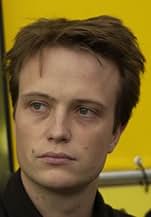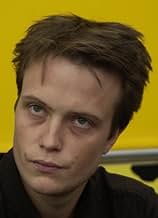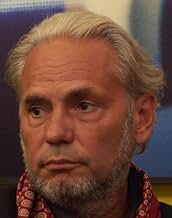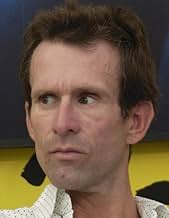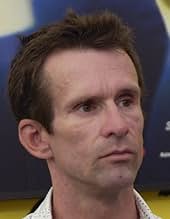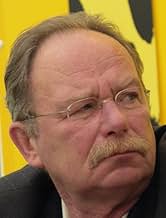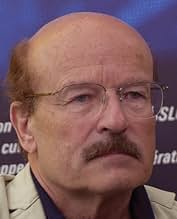Agrega una trama en tu idiomaA drama loosely based on Jean Bernard's Nazi-era prison diary.A drama loosely based on Jean Bernard's Nazi-era prison diary.A drama loosely based on Jean Bernard's Nazi-era prison diary.
- Dirección
- Guionistas
- Elenco
- Premios
- 6 premios ganados y 13 nominaciones en total
Vladimír Fiser
- Bischof Kozal
- (as Vladimir Fiser)
Peter Varga
- Józef (Polish Inmate)
- (as Petr Varga)
- Dirección
- Guionistas
- Todo el elenco y el equipo
- Producción, taquilla y más en IMDbPro
Opiniones destacadas
It showed just all the considerations that the Vatican and the clergy had to make and how complicated and not black and white their decisions were based upon. Not everything is as obvious as it seems. And it was not a Catholic based excuse movie for decisions made, it was just the facts. And it wasn't just the church that had to make these difficult considerations in WW2, but many governments and institutions. When your dealing with a madman who can like current day Putin, kill tens of and hundreds of thousands of people because of a single slight, you certainly have to be careful in your decisions. Just as the NATO decision on a no fly zone over Ukraine decision is. Sure we want to do it but is it worth starting WW3 over? Decisions I'm certainly glad I'll never have to make.
During WW2 a priest named Henry Kremer(Ulrich Matthes) imprisoned in concentration camp of Dachau is freed along a period of 9 days. He's threatened by a SS Unterstumfuhrer(August Dhiel) to convince the Luxemburg bishop(Tathe) to write a declaration for supporting the Nazi regime . The priest is affected because of his decision whether or not to collaborate with the Nazis.
This is an intelligent and thought-provoking film , correctly based on real events. The director covers a wide variety of plot developments at a rare pace by means of continuous flashbacks in which remembers horrible events at concentration camp of Duchau. Excellent performances by main cast as Ulrich Matthes (Goebbles in ¨The downfall¨) and August Dhiel(Ingorious bastards). Good secondary cast as Bibiana Beglau (Legend of Rita by Schlondorff) as the affecting sister . The musical score is often despairing and screeching with surprising witty touches , it is composed by Russian musician Alfred Schnitke(1934-88). The motion picture is well directed by Volker Scholondorff. He's an expert on Nazi issues as proved in ¨Tim drum¨ , ¨The ogre¨ and this one. Schlondorff does a very unusual pictures with important insight into how the past affects the present and root causes of war. His first feature film, ¨Young Torless¨ was showed around the world and he was pretty heard by international viewers when directed ¨The lost honour of Katharine Blum¨, getting similar success his fellow-countrymen as Fassbinder, Herzog and Wenders. His reputation was greatly enhanced when his phenomenal movie ¨Tin drum¨ was awarded the Oscar as best foreign-language film. Later on,Schlondorff consolidated with ¨Circle of deceits¨. Since then his films have been less satisfactory as ¨Murder in the Bayou¨ , ¨Handmaid's tale¨and ¨Palmetto¨.
Rating : Very good , Schlondorff's one the last impressive film to date. The film is admirable coherent , though in complicated narrative and never sags under its approx. hundred minutes . The movie will appeal to Nazi theme buffs
This is an intelligent and thought-provoking film , correctly based on real events. The director covers a wide variety of plot developments at a rare pace by means of continuous flashbacks in which remembers horrible events at concentration camp of Duchau. Excellent performances by main cast as Ulrich Matthes (Goebbles in ¨The downfall¨) and August Dhiel(Ingorious bastards). Good secondary cast as Bibiana Beglau (Legend of Rita by Schlondorff) as the affecting sister . The musical score is often despairing and screeching with surprising witty touches , it is composed by Russian musician Alfred Schnitke(1934-88). The motion picture is well directed by Volker Scholondorff. He's an expert on Nazi issues as proved in ¨Tim drum¨ , ¨The ogre¨ and this one. Schlondorff does a very unusual pictures with important insight into how the past affects the present and root causes of war. His first feature film, ¨Young Torless¨ was showed around the world and he was pretty heard by international viewers when directed ¨The lost honour of Katharine Blum¨, getting similar success his fellow-countrymen as Fassbinder, Herzog and Wenders. His reputation was greatly enhanced when his phenomenal movie ¨Tin drum¨ was awarded the Oscar as best foreign-language film. Later on,Schlondorff consolidated with ¨Circle of deceits¨. Since then his films have been less satisfactory as ¨Murder in the Bayou¨ , ¨Handmaid's tale¨and ¨Palmetto¨.
Rating : Very good , Schlondorff's one the last impressive film to date. The film is admirable coherent , though in complicated narrative and never sags under its approx. hundred minutes . The movie will appeal to Nazi theme buffs
The basic idea of this film is rather interesting. There was a catholic priest from Luxembourg imprisoned in the concentration camp Dachau during the Second Word War. He wrote a diary describing daily camp life. But for 9 days he is allowed to get back to his family for the funeral of his mother. It is known that he is interrogated by the GESTAPO. But he does not tell anything about it in his diary. So the film fills the historic gap with some fiction. We are told the story of a young Nazi official who tries to convince the priest to get his bishop to stop his passive resistance. So far so good. Quite conceivable that this actually happened. But. The whole thing is just not believable. The dialogs are weak, so far as there are dialogs at all. Most of the time Uli Matthes, who is supposedly one of the best German actors, is silent. You just see his face with an expression that you can put anything into. That of course is impressive. But it is not acting. We are told that he is brilliant, but it is never shown. He just has switched uniforms. He recently played Goebbels in the Downfall. What I had expected was some real intellectual argument between the Nazi guy and a catholic intellectual. There is next to nothing of it. Some argument about Judas but it is never clear what this is supposed to proof. There is never a moment of doubt about the outcome of the "intellectual battle". And because of this the film is a failure. Very good music, though and some good scenes of the concentration camp life.
The Ninth Day is based on the true story of a Luxembourger priest (Henri) who is sent to Dachau concentration camp (among thousands of other priests in WW II) for standing against the Nazi regime. The film brilliantly contrasts the hell of the concentration camp with making a deal with the devil (i.e. the Nazi regime that sent him there) once Henri is "freed" to return home. Some very weak-minded individuals will call this film "propaganda", since it accurately portrays the persecution of the Catholic church (both the clergy and the laity) under the Nazi regime rather than the historical revisionism which was popularized by the communist bloc over the last few decades. Not for the faint of heart (there is very graphic brutality throughout), it is definitely worth watching as both a time-capsule of life during occupied countries during the Nazi regime as well as a wake-up call to future generations.
I have no great sympathy for the Catholic Church, but I found the movie quite moving while watching it. There were some rank-and-file Catholic (and Protestant) clergy who spoke up against Nazism. They paid a heavy price - in part because there wasn't an outcry on the part of the higher-ups in the church hierarchy. They were more interested in keeping their perks and playing nice with the powers-that-be. This silent betrayal is very well conveyed in the movie.
Unfortunately some of the other dramatic elements don't work as well. I think the movie would have been stronger if Henri Kremer's relationship with his family -- his sister especially, who was willing to put her life on the life so he could flee to freedom -- had been more fleshed out. They don't even show their parting! So although I was interested throughout the movie, it was not quite satisfying.
Unfortunately some of the other dramatic elements don't work as well. I think the movie would have been stronger if Henri Kremer's relationship with his family -- his sister especially, who was willing to put her life on the life so he could flee to freedom -- had been more fleshed out. They don't even show their parting! So although I was interested throughout the movie, it was not quite satisfying.
¿Sabías que…?
- ErroresWhile their fellow-prisoner is being crucified, the priests are singing the hymn "Pange, lingua, gloriosi" by Thomas Aquinas (1264). However, they are singing a German version of this song, which was not in use before 1969. In addition, even if they happened to know a German version, it would be more likely for them to sing the original Latin version, as there were priests from all over Europe imprisoned in this block.
- ConexionesReferenced in ¡Sí señor! (2008)
- Bandas sonorasConcerto Grosso No. 1
Music by Alfred Schnittke
Selecciones populares
Inicia sesión para calificar y agrega a la lista de videos para obtener recomendaciones personalizadas
- How long is The Ninth Day?Con tecnología de Alexa
Detalles
- Fecha de lanzamiento
- Países de origen
- Sitio oficial
- Idiomas
- También se conoce como
- The Ninth Day
- Locaciones de filmación
- Productoras
- Ver más créditos de la compañía en IMDbPro
Taquilla
- Total en EE. UU. y Canadá
- USD 72,888
- Fin de semana de estreno en EE. UU. y Canadá
- USD 8,786
- 29 may 2005
- Total a nivel mundial
- USD 135,311
- Tiempo de ejecución
- 1h 38min(98 min)
- Mezcla de sonido
- Relación de aspecto
- 1.85 : 1
Contribuir a esta página
Sugiere una edición o agrega el contenido que falta

